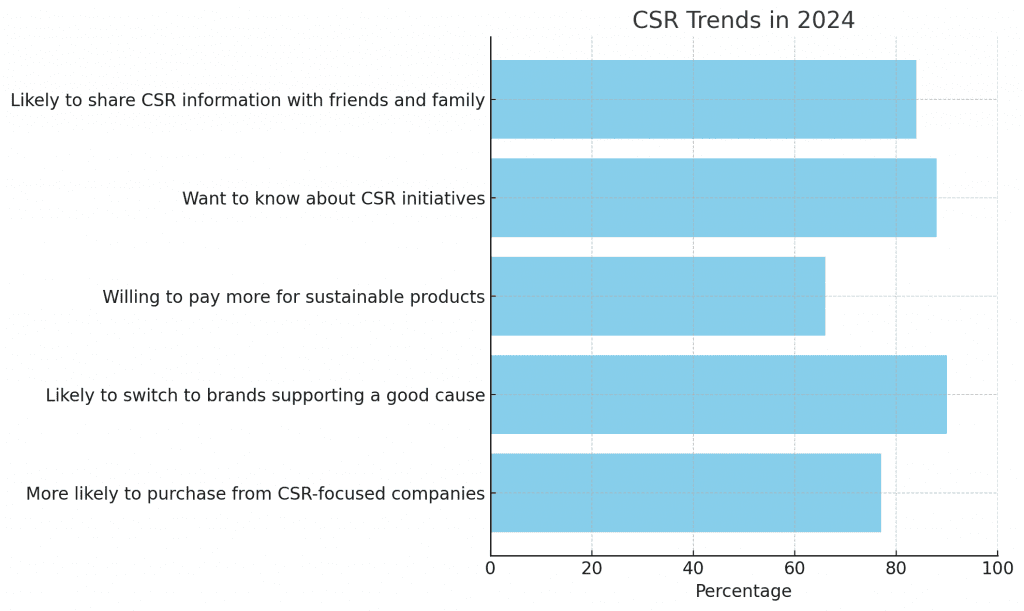
In today’s global market, the importance of Corporate Social Responsibility (CSR) cannot be overstated, particularly for sustainable businesses. CSR embodies a business model where companies integrate social and environmental concerns into their operations and interactions with stakeholders. For sustainable businesses, CSR is not just a strategy but a fundamental ethos that drives their operations, ensuring they contribute positively to society and the environment while maintaining economic viability.
The Evolution of Corporate Social Responsibility
The roots of CSR can be traced back to the philanthropic activities of 19th-century industrialists like Andrew Carnegie and John D. Rockefeller, who believed in contributing to societal well-being. The modern concept of CSR began to take shape in the mid-20th century, with Howard R. Bowen’s seminal work, “Social Responsibilities of the Businessman.” The subsequent decades saw the rise of social movements and environmentalism, which pressured companies to adopt more responsible practices.
In the late 20th century, frameworks such as John Elkington’s “triple bottom line” emphasized the need for businesses to focus on social, environmental, and financial performance. The adoption of global standards, like the UN Global Compact and ISO 26000, further formalized CSR practices.
Key Statistics on CSR in 2024
We can identify a few key statistics when it comes to CSR in 2024. We briefly explain them below.
- Employee Engagement and Retention:
- Positive Company Culture: 96% of employees report a positive company culture due to volunteering initiatives, emphasizing the role of CSR in enhancing workplace morale and engagement.
- Reduced Employee Turnover: Approximately 50% of employee turnover can be reduced through socially valuable projects, illustrating the retention benefits of CSR practices.
- Consumer Preferences:
- Brand Loyalty and Purchase Motivation: 77% of consumers are more motivated to purchase from companies devoted to CSR, and over 90% would switch to more sustainable brands.
- Demand for Transparency: 88% of consumers seek information on a company’s CSR initiatives when considering a purchase, highlighting the importance of transparency in CSR efforts.
- Investor Interest:
- Valuation Premium: Companies that lead in environmental, social, and governance (ESG) efforts have an 11% valuation premium over their competitors, indicating the financial benefits of strong CSR practices.
Corporate Social Responsibility in Industry
There is no other industry than the agriculture industry where CSR can be meaningfully adopted. It includes sustainable and ethical practices that promote environmental stewardship, social equity, and economic viability.
Key initiatives in this industry include:
- Sustainable Farming Practices: Methods like crop rotation and organic farming minimize environmental impact and maintain soil health.
- Water Conservation: Efficient use of water resources through practices like drip irrigation and rainwater harvesting.
- Reduction of Chemical Usage: Limiting synthetic fertilizers and pesticides to protect ecosystems.
- Animal Welfare: Ensuring humane treatment of livestock.
- Support for Local Communities: Investing in community development and creating employment opportunities.
- Fair Trade Practices: Ensuring fair wages and decent working conditions for farmers and workers.
- Climate Change Mitigation: Adopting practices that reduce greenhouse gas emissions.
- Supply Chain Transparency: Promoting ethical sourcing and building consumer trust.
- Innovation and Technology: Using technologies that increase efficiency while minimizing environmental impact.
- Education and Training: Providing farmers with training on sustainable practices and business skills.
Being a Responsible Employer
But there’s more. An integral part of CSR is being a responsible employer. This involves a long list of ethics, of which we will name the most important ones below:
- Fair Wages and Benefits: Offering competitive compensation and comprehensive benefits.
- Safe Working Conditions: Ensuring a safe and healthy work environment.
- Employee Development: Investing in training and career development.
- Work-Life Balance: Promoting flexible working hours and support for personal needs.
- Diversity and Inclusion: Fostering a diverse and inclusive workplace.
- Employee Engagement: Encouraging open communication and participation in decision-making.
- Health and Well-being: Supporting physical and mental health through wellness programs.
- Ethical Practices: Upholding high ethical standards in all interactions with employees.
- Social Responsibility: Encouraging employee involvement in community service.
- Job Security and Stability: Providing job security and supporting employees during economic uncertainties.
Trends in CSR for 2024
Through our research we identified a few trends for 2024 and beyond which will shape CSR in the near future. These are the main ones we can expect.
- Integration into Business Strategy:
- Companies are increasingly embedding CSR into their core business strategies, emphasizing the importance of social impact alongside business and financial goals. This integration enhances business resilience and agility in a dynamic market environment.
- Sustainability Focus:
- There is a growing emphasis on sustainability, with businesses investing more in renewable energy, reducing emissions, and adopting circular economy practices. This trend is driven by both consumer demand and regulatory pressures.
- Diversity, Equity, and Inclusion (DEI):
- Promoting DEI within the workplace remains a key priority. Companies are working with diverse suppliers, recruiting from underrepresented backgrounds, and supporting causes that uplift marginalized communities.
- Ethical Use of AI:
- As AI becomes more integrated into business operations, companies are focusing on its ethical adoption, ensuring that AI practices align with their CSR values.
- Measurement and Transparency:
- Companies are under increasing pressure to measure and transparently report their CSR efforts. This includes tracking and reducing Scope 3 emissions, which are often the largest part of a company’s carbon footprint.
Latest CSR Statistics for 2024: Key Insights for Visualization

Not convinced yet? Here are some of the most recent statistics and insights for 2024 to think about.
- Consumer Behavior and CSR:
- 77% of consumers are more likely to purchase from companies committed to making the world a better place.
- 90% of global shoppers are likely to switch to brands that support a good cause.
- 66% of consumers worldwide are willing to pay more for sustainable products.
- 88% of people want to know about corporate CSR initiatives, with 84% willing to share this information with friends and family.
- Employee Engagement and CSR:
- 93% of employees believe it is essential for companies to lead with purpose, and 95% feel businesses should benefit all stakeholders, including employees, customers, suppliers, and communities.
- 92% of employees at purpose-driven companies are more likely to recommend their employer to job seekers.
- 60% of employees would accept lower pay to work at a socially responsible company.
- Investor Preferences and CSR:
- 73% of investors consider CSR factors when making investment decisions.
- Companies with strong CSR practices are 50% more likely to successfully enter new markets.
- Corporate Commitment to CSR:
- 94% of major US corporations plan to increase or maintain their corporate giving over the next few years.
- 90% of companies in the S&P 500 Index issued a CSR report in 2019, up from just 20% in 2011, showing the growing importance of transparency and reporting.
- Impact of CSR on Brand Loyalty:
- 84% of consumers might stop buying from brands with poor environmental records.
- 88% of consumers believe it’s unacceptable for companies to profit at society’s expense, and 70% are unlikely to support profit-driven companies without social accountability.
Business Case for CSR
The business case for CSR is clearer than ever, with a growing number of executives recognizing the return on investment in sustainability initiatives. Investments in CSR not only improve a company’s reputation and customer loyalty but also enhance employee satisfaction and investor confidence. As more organizations understand the value of CSR, the trend towards integrating social and environmental responsibility into business operations is expected to continue growing.
CSR is not merely a buzzword but a vital component of a sustainable business strategy. It reflects a company’s commitment to ethical practices, environmental stewardship, and social responsibility. By focusing on these areas, sustainable businesses can build a reputation for integrity, attract conscientious consumers, and contribute to a healthier, more sustainable world.
Businesses can thus create a positive impact on society and the environment while achieving long-term economic success. This approach not only helps in building a sustainable future but also ensures that companies remain competitive and resilient in the face of evolving market demands. In short, it’s a pure win win approach.
Sources
Here are the sources we used for this article.
